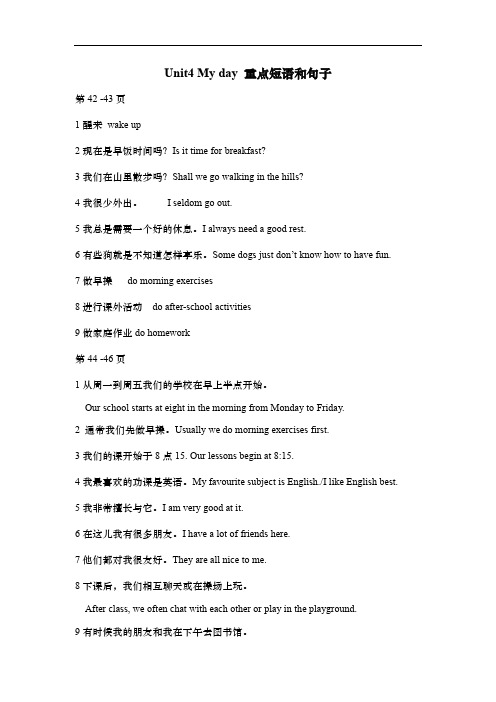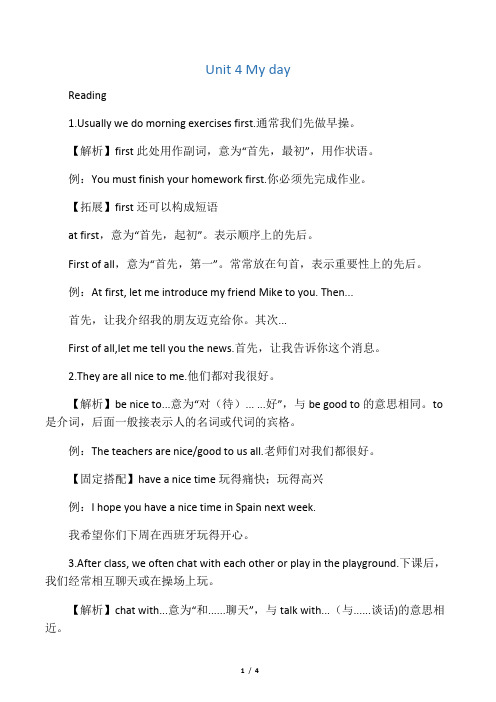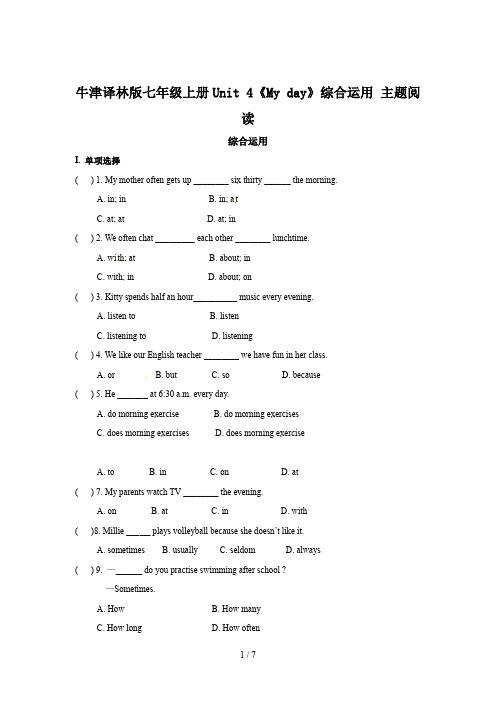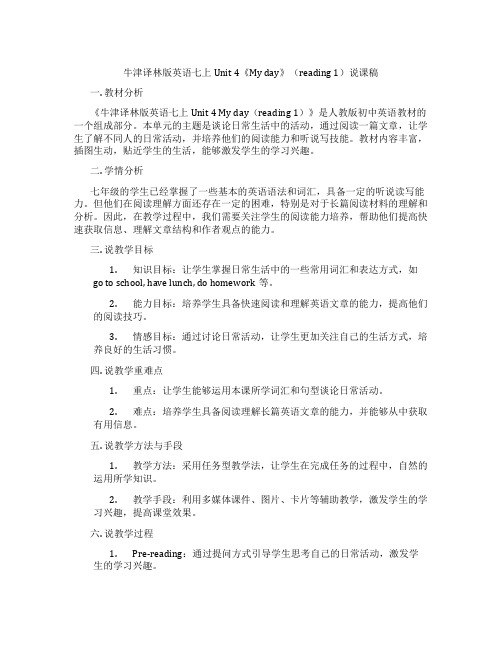牛津译林版英语七年级上册《My day》Reading
牛津译林版七年级上册Unit4《Myday》(第6课时)说课稿

牛津译林版七年级上册Unit 4《My day》(第6课时)说课稿一. 教材分析《牛津译林版七年级上册Unit 4 My day》第6课时,主要讲述了一天中的活动以及表达自己一天中的安排。
通过本课时学习,学生能够掌握一般现在时态的运用,学会如何用英语描述自己一天的活动。
教材内容丰富,贴近学生生活,有助于激发学生学习兴趣,提高学生英语运用能力。
二. 学情分析七年级的学生已经掌握了基本的英语语法知识,对一般现在时态有所了解。
但部分学生对英语表达仍存在一定的困难,特别是在描述自己一天的活动方面。
因此,在教学过程中,需要关注学生的个体差异,引导他们积极参与课堂活动,提高他们的英语表达能力。
三. 说教学目标1.知识目标:学生能够掌握一般现在时态的运用,学会用英语描述自己一天的活动。
2.能力目标:通过听力、口语、阅读和写作等实践活动,提高学生的英语运用能力。
3.情感目标:培养学生热爱生活、珍惜时间的态度,养成良好的学习习惯。
四. 说教学重难点1.教学重点:一般现在时态的运用,描述自己一天的活动。
2.教学难点:如何引导学生运用所学知识,真实地描述自己的一天,提高英语表达能力。
五. 说教学方法与手段1.任务型教学法:通过设定各种任务,让学生在完成任务的过程中,自然地学习和运用英语。
2.情境教学法:创设生活情境,让学生在真实的环境中,学会用英语描述自己的一天。
3.小组合作学习:鼓励学生互相交流、讨论,提高课堂参与度,培养学生团队合作精神。
4.多媒体辅助教学:利用课件、视频等资源,丰富教学手段,提高学生学习兴趣。
1.热身(5分钟):通过提问学生一天的活动,引导学生回顾已学知识,为新课学习做好铺垫。
2.呈现(10分钟):利用课件展示一天的活动图片,引导学生用英语描述图片内容,引出本课主题。
3.任务型学习(15分钟):学生分组,每组完成一个描述自己一天活动的任务,如制作海报、编写故事等。
4.口语练习(10分钟):学生模拟情景,用英语描述自己的一天,培养口语表达能力。
牛津译林版英语七上Unit4《Myday》(reading1)说课稿1

牛津译林版英语七上Unit 4《My day》(reading 1)说课稿1一. 教材分析《牛津译林版英语七上Unit 4 My day(reading 1)》的主要内容是讲述一个名叫Li Ming的学生的一天。
通过阅读这篇课文,学生们可以了解到Li Ming的日常生活,包括他早上起床、吃早餐、上学、放学后做作业、吃晚餐和睡觉等活动。
这篇课文旨在让学生们掌握一般过去时的运用,学会如何描述过去的事件。
二. 学情分析针对七年级的学生,他们对英语有了一定的基础,能够进行简单的听、说、读、写。
但学生在阅读理解方面还存在一定的困难,因此需要教师在教学过程中给予充分的引导和帮助。
此外,学生对一般过去时的掌握还不够熟练,需要通过课文学习和实践来提高。
三. 说教学目标1.知识目标:让学生掌握一般过去时的基本用法,学会描述过去的事件。
2.能力目标:提高学生的阅读理解能力,培养学生运用英语进行交流的能力。
3.情感目标:激发学生学习英语的兴趣,培养他们积极乐观的人生态度。
四. 说教学重难点1.重点:一般过去时的运用,学生能够正确描述过去的事件。
2.难点:对课文内容的理解,特别是时间状语从句的运用。
五. 说教学方法与手段1.教学方法:采用任务型教学法,让学生在完成任务的过程中学习英语。
2.教学手段:利用多媒体课件、图片、情景剧等形式,提高学生的学习兴趣。
六. 说教学过程1.导入:通过提问学生一天的活动,引出本课的主题。
2.阅读理解:学生自主阅读课文,回答相关问题。
教师针对学生回答进行讲解和引导。
3.语法讲解:讲解一般过去时的用法,让学生学会如何描述过去的事件。
4.小组讨论:学生分组讨论,用英语描述自己的一天。
5.情景剧表演:学生分组表演情景剧,运用一般过去时描述角色的一天。
6.总结:教师对本节课的内容进行总结,强调一般过去时的运用。
7.作业布置:让学生写一篇关于自己一天的英语作文。
七. 说板书设计板书设计如下:1.一般过去时:过去的时间 + 动词过去式2.时间状语从句:when, after, before, while3.描述过去事件的步骤:a.确定时间b.描述活动c.表达感受八. 说教学评价1.课堂参与度:观察学生在课堂上的积极参与情况,包括回答问题、小组讨论等。
牛津译林版七年级英语上册Unit4 My day 重点短语和句子

Unit4 My day 重点短语和句子第42 -43页1醒来wake up2现在是早饭时间吗?Is it time for breakfast?3我们在山里散步吗?Shall we go walking in the hills?4我很少外出。
I seldom go out.5我总是需要一个好的休息。
I always need a good rest.6有些狗就是不知道怎样享乐。
Some dogs just don’t know how to have fun. 7做早操do morning exercises8进行课外活动do after-school activities9做家庭作业do homework第44 -46页1从周一到周五我们的学校在早上半点开始。
Our school starts at eight in the morning from Monday to Friday.2 通常我们先做早操。
Usually we do morning exercises first.3我们的课开始于8点15. Our lessons begin at 8:15.4我最喜欢的功课是英语。
My favourite subject is English./I like English best. 5我非常擅长与它。
I am very good at it.6在这儿我有很多朋友。
I have a lot of friends here.7他们都对我很友好。
They are all nice to me.8下课后,我们相互聊天或在操场上玩。
After class, we often chat with each other or play in the playground.9有时候我的朋友和我在下午去图书馆。
Sometimes my friends and I go to the library in the afternoon.10我们有一个阅读俱乐部。
七年级上册英语Unit 4 My day Reading知识点梳理-译林版

Unit 4 My dayReadingually we do morning exercises first.通常我们先做早操。
【解析】first此处用作副词,意为“首先,最初”,用作状语。
例:You must finish your homework first.你必须先完成作业。
【拓展】first还可以构成短语at first,意为“首先,起初”。
表示顺序上的先后。
First of all,意为“首先,第一”。
常常放在句首,表示重要性上的先后。
例:At first, let me introduce my friend Mike to you. Then...首先,让我介绍我的朋友迈克给你。
其次...First of all,let me tell you the news.首先,让我告诉你这个消息。
2.They are all nice to me.他们都对我很好。
【解析】be nice to...意为“对(待)... ...好”,与be good to的意思相同。
to 是介词,后面一般接表示人的名词或代词的宾格。
例:The teachers are nice/good to us all.老师们对我们都很好。
【固定搭配】have a nice time玩得痛快;玩得高兴例:I hope you have a nice time in Spain next week.我希望你们下周在西班牙玩得开心。
3.After class, we often chat with each other or play in the playground.下课后,我们经常相互聊天或在操场上玩。
【解析】chat with...意为“和......聊天”,与talk with...(与......谈话)的意思相近。
例:Do you often chat with your friends?你经常和你的朋友们聊天吗?【解析】each other相当于代词,表示相互关系,意为“互相,彼此”。
牛津译林版英语七上Unit4《Myday》(Grammar)说课稿

牛津译林版英语七上Unit 4《My day》(Grammar)说课稿一. 教材分析《牛津译林版英语七上Unit 4 My day》主要讲述了日常生活中的活动安排和描述。
通过本单元的学习,学生能够掌握一般现在时态的运用,学会如何用英语描述自己的日常活动。
本单元的核心语法是一般现在时,学生需要掌握其构成、用法以及与一般过去时和一般将来时的区别。
二. 学情分析七年级的学生已经初步掌握了英语的基础知识,具备一定的听、说、读、写能力。
但在此阶段,学生对英语的语法知识掌握还不够深入,需要通过大量的练习来巩固。
此外,学生的学习兴趣和积极性对英语学习成果有很大影响,因此,激发学生的学习兴趣和动机是本节课的重要任务。
三. 说教学目标1.知识目标:学生能够掌握一般现在时的构成、用法,学会用英语描述自己的日常活动。
2.能力目标:学生能够在实际情景中运用一般现在时,提高英语表达能力。
3.情感目标:培养学生热爱生活、积极向上的生活态度,增强同学间的友谊。
四. 说教学重难点1.教学重点:一般现在时的构成、用法以及与一般过去时、一般将来时的区别。
2.教学难点:一般现在时的运用,特别是在具体情境中的运用。
五. 说教学方法与手段本节课采用任务型教学法,通过各种互动活动,让学生在实际操作中掌握一般现在时的用法。
同时,运用多媒体手段,如图片、视频等,辅助教学,提高学生的学习兴趣。
六. 说教学过程1.导入:以一幅描绘日常活动的图片引导学生进行观察,激发学生对课程的兴趣。
2.呈现:通过展示一段视频,让学生了解一般现在时的用法,同时引入本节课的主题。
3.操练:设计各种任务,让学生在实际操作中运用一般现在时,如描述自己的日常活动、编写对话等。
4.巩固:通过小组活动,让学生在互动中进一步巩固一般现在时的用法。
5.拓展:引导学生运用一般现在时描述未来的计划,培养学生的创新思维。
6.总结:对本节课的内容进行归纳总结,强调一般现在时的用法。
7.作业:布置相关练习,让学生课后巩固所学知识。
牛津译林初中七年级上册英语 Unit 4《My day Reading 1》课件3

III. 根据所给汉语完成句子。 1. 人们说玛丽是个聪明伶俐的女孩。
People say Mary is a_c_le_v_e_r_ __g_ir_l__. 2. 我们学校的一天从八点开始。 Our _sc_h_o_o_lday_s_ta_r_t_s__a_t_8:00 every day. 3. 我们期待着在外面好好过一天。 We __w_i_sh__ to _h_a_v_e_ a great day outside.
( T ) 1. Millie likes her school very much. ( F ) 2. School starts at 8.15 at Millie’s
school.
( T ) 3. English is Millie’s favourite subject. ( F ) 4. Millie seldom chats with her friends
We read books
We practise volleyball.
Now let’s read the passage together and then finish B3 on P46
Complete the conversation between Joan and Tommy. Joan: I know your friend Millie is now at
every Saturday. 3. I __a_m__g_o_o_d__a_t_ English, for I go to
the English Club every Wednesday. 4. We must learn from ___e_a_c_h_o_t_h_e_r___. 5. The students always _h_a_v_e_a__g_o_o_d__ti_m_e_
牛津译林版七年级上册Unit 4《My day》综合运用 主题阅读

牛津译林版七年级上册Unit 4《My day》综合运用主题阅读综合运用I. 单项选择( ) 1. My mother often gets up ________ six thirty ______ the morning.A. in; inB. in; a tC. at; atD. at; in( ) 2. We often chat _________ each other ________ lunchtime.A. wi th; atB. about; inC. with; inD. about; on( ) 3. Kitty spends half an hour__________ music every evening.A. listen toB. listenC. listening toD. listening( ) 4. We like our English teacher ________ we have fun in her class.A. orB. butC. soD. because( ) 5. He _______ at 6:30 a.m. every day.A. do morning exerciseB. do morning exercisesC. does morning exercisesD. does morning exerciseA. toB. inC. onD. at( ) 7. My parents watch TV ________ the evening.A. onB. atC. inD. with( )8. Millie ___ __ plays volleyball because she doesn’t like it.A. sometimesB. usuallyC. seldomD. always( ) 9. —______ do you practise swimming after school ?—Sometimes.A. HowB. How manyC. How longD. How often( ) 10. He is very busy. He has no time ______ with his friends.A. chatB. chattingC. to chatD. chats ( ) 11. It’s time ______ class. Listen ________ the teacher.A. to; toB. of; withC. for; afterD. for; to ( ) 12. Do you know the answer __________ the question?A. toB. ofC. atD. in ( ) 13. Lily hates fish. She _______ eats it.A. neverB. alwaysC. usuallyD. often ( )14. —May I borrow your CD player?—________.A. I don’t have oneB. I am sorry. I don’t knowC. Sorry, I don’t hav e oneD. Yes, I do( ) 15. Shall we _______ walking in the hill?A. goingB. goC. to goD. is goingII. 句型转换(改为一般疑问句,并作否定回答)_________________________________________________2. They do morning exercises every day. (改为否定句)_________________________________________________3. I like my classroom because it is big and clean. (对划线部分提问)_________________________________________________lie goes to the Reading Club twice a week. (对划线部分提问)_________________________________________________5. Kitty helps Amy and Amy helps Kitty too. (改为同义句)_________________________________________________6. It takes me half a day to make this model plane. (改为同义句)_________________________________________________7. He seldom takes a taxi to go to school. (对划线部分提问)_________________________________________________8. We play badminton for half an hour every day.( 对划线部分提问) _________________________________________________9. He likes playing volleyball very much. (改为一般疑问句)_________________________________________________10. We have the football match once a month. (对划线部分提问)_________________________________________________III. 根据所给汉语完成句子1. 请明天早上6点钟叫醒我。
牛津译林版英语七上Unit 4《My day》(Reading 1)说课稿

牛津译林版英语七上Unit 4《My day》(reading 1)说课稿一. 教材分析《牛津译林版英语七上Unit 4 My day(reading 1)》是人教版初中英语教材的一个组成部分。
本单元的主题是谈论日常生活中的活动,通过阅读一篇文章,让学生了解不同人的日常活动,并培养他们的阅读能力和听说写技能。
教材内容丰富,插图生动,贴近学生的生活,能够激发学生的学习兴趣。
二. 学情分析七年级的学生已经掌握了一些基本的英语语法和词汇,具备一定的听说读写能力。
但他们在阅读理解方面还存在一定的困难,特别是对于长篇阅读材料的理解和分析。
因此,在教学过程中,我们需要关注学生的阅读能力培养,帮助他们提高快速获取信息、理解文章结构和作者观点的能力。
三. 说教学目标1.知识目标:让学生掌握日常生活中的一些常用词汇和表达方式,如go to school, have lunch, do homework等。
2.能力目标:培养学生具备快速阅读和理解英语文章的能力,提高他们的阅读技巧。
3.情感目标:通过讨论日常活动,让学生更加关注自己的生活方式,培养良好的生活习惯。
四. 说教学重难点1.重点:让学生能够运用本课所学词汇和句型谈论日常活动。
2.难点:培养学生具备阅读理解长篇英语文章的能力,并能够从中获取有用信息。
五. 说教学方法与手段1.教学方法:采用任务型教学法,让学生在完成任务的过程中,自然的运用所学知识。
2.教学手段:利用多媒体课件、图片、卡片等辅助教学,激发学生的学习兴趣,提高课堂效果。
六. 说教学过程1.Pre-reading:通过提问方式引导学生思考自己的日常活动,激发学生的学习兴趣。
2.While-reading:让学生快速阅读文章,回答问题,培养他们的阅读理解能力。
引导学生关注文章结构和作者观点,提高他们的阅读技巧。
3.Post-reading:让学生进行小组讨论,分享自己的日常活动,培养他们的口语表达能力。
- 1、下载文档前请自行甄别文档内容的完整性,平台不提供额外的编辑、内容补充、找答案等附加服务。
- 2、"仅部分预览"的文档,不可在线预览部分如存在完整性等问题,可反馈申请退款(可完整预览的文档不适用该条件!)。
- 3、如文档侵犯您的权益,请联系客服反馈,我们会尽快为您处理(人工客服工作时间:9:00-18:30)。
* Millie usually does morning exercises first.
exercise cn. 操、练习题 un. 运动、锻炼
The students always ___d_o____ __e_ye_____ _e_x_e_rc_i_s_es_ first before Maths lessons. They have some Maths _e_x_er_c_i_se_s_ to do in class. After class, they like to do some _e_x_e_rc_i_s_e_ in the playground.
* Millie is chatting with her friends.
They’re chatting with each other.
chat with sb. 和…聊天 (chatting) each other 相互
Millie has a lot of friends at school. When they meet at the school gate, they say ___h_e_ll_o__ __t_o_____ ___e_a_c_h__ ___o_th_e_r__. If they meet something difficult, they always _h_e_l_p____ __e_a_c_h___ ___o_th_e_r__. Sometimes they __w_r_i_te___ ___t_o____ ___e_a_c_h__ ___o_th_e_r__.
_m_o_r_n_i_n_g_ ___f_ro_m___ Monday ___t_o____ Friday. It
closes at eight thirty ___o_n____ ___F_r_id_a_y_
_e_v_e_n_in_g__.
Monday—Thursday: 2 p.m. ~ 5 p.m. Friday: 2 p.m. ~ 8:30 p.m.
C My day
1. Our school starts at ______. 2. Our lessons begin at ______. 3. My favourite subject is ____. 4. After class, I ___________. 5. I _____________________
4. 放学后,基蒂通常先去舞蹈俱乐部练跳舞。
_A__ft_e_r_s_c_h_o_o_l_______, Kitty usually __p_r_a_c_t_is_e_s_____
_d_a_n_c_i_n_g__i_n_________ the Dancing Club __f_ir_s_t____. 5. 瞧!我的同学们正在操场上开心地玩耍。
《My day》 Reading
牛津译林版英语七年级上册
超多互动!超多素材!总有你喜欢的。为教学插上翅膀!
1. What does she do at school in the morning? 2. What time do they begin to have lessons? 3. What’s her favourite subject? 4. Does she have any friends at school? 5. What do they do after class? 6. Do they have many lessons in the afternoon? 7. What do they often do in the afternoon? 8. How does Millie like her school?
* Millie is practising volleyball. Millie is practising playing volleyball.
练习某事 practise sth 练习 做某事 practise doing sth
Look! These students ___a_r_e___ _p_r_a_c_ti_si_n_g__E_n_g_l_is_h_ in the classroom. They often __p_ra_c_t_is_e _r_e_a_d_in_g__ __E__n_g_li_s_h in the morning at school.
* Best wishes. All the best. Take care. 祝好
(书信结束语)
Today is 10th September. It’s Teachers’ Day. Many students are giving their __b_e_st___ __w_i_s_h_e_s _____to___ their teacher. Look! How happy the teacher is!
* Millie goes to school from Monday to Friday.
The school starts at eight in the morning.
The school starts at eight on Monday morning.
从……到…… from … to …
Look! My classmates _a_r_e__h_a_v_in_g__a__g_o_o_d__t_im__e_/____
_h_a_v_in__g_f_u_n_/__en__jo_y_i_n_g_t_h_e_m_s_e_lv_e_s_i_n__th_e__p_la_y_g_r_o_u_n_d__.
3. Finish the exercises of Unit 4 in the workbook.
1. 我爸爸总是在晚上七点到七点半收看联播。
My father always watches the news
_f_r_o_m__s_ev_e_n__to__s_e_ve_n__th__ir_ty__in__t_h_e_e_v_e_n_in__g__________.
2. 周一上午我们不做广播操。
在早晨 in the morning 在中午 in the afternoon 在晚上 in the evening
在早晨/中午/晚上 用介词 _i_n_ 在某天的早/中/晚 用介词 _o_n_
This is the library in Sunshine Middle School. It opens at two o’clock __i_n_____ ____th__e__
___________after school.
1. Practise talking about your own or someone else’s school life with your classmates.
2. Remember the useful phrases and sentence structures.
We don’t _d_o_m__o_rn__in_g__e_x_e_rc_i_se_s__o_n_M__o_n_d_a_y__m_o_r_n_i_n_g_.
3.
你在和米莉以互发电子邮件的方式聊天吗? Are you _c_h_a_t_ti_n_g_w__it_h Millie by _w_r_it_in_t_go_e_em_aa_cih_l_s_o_th_e_r_?
* They have a good time at school.
They have fun at school.
They enjoy themselves at school.
have a good time 过得愉快、
have is busy eating and sleeping all day! Hobo doesn’t think Eddie ____h_a_s_f_u_n__/_e_n_jo_y_s__h_im__s_e_lf_/___ ____h_a_s_a__g_o_o_d_t_i_m_e___________.
